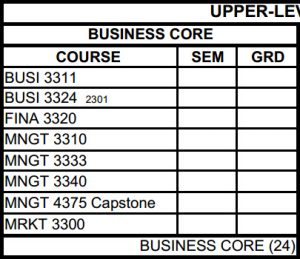The upper-level business core is the heart of the BBA degree. It’s a set of courses that serve as the basis for a business education.

Like the lower-level business core, it’s pretty straightforward. There are a few things to note, mainly that some of these courses have been called other things.
| Course | Title | Notes |
| ACCT/MNGT 3333 | Information Systems | BBA students can take it either as ACCT or MNGT 3333. |
| BUSI 3311 | Business Communications | Was called MNGT 3311 until recently. |
| BUSI 3324 | Business and the Law | Was called MNGT 3324 for most of UTPB’s history. Was called MNGT 2301 from 2016-2019. We’ll accept TCCN BUSI 2301 for this requirement. |
| FINA 3320 | Principles of Finance | – |
| MNGT 3310 | Management Concepts | Its actual full name is Management Concepts and Organizational Theory. I’m going to try and rename it Principles of Management this academic year. |
| MNGT 3340 | Production and Operations Management | – |
| MRKT 3300 | Principles of Marketing | – |
AACSB Requirement for the Upper-Level Core
The majority of the upper-level business core must come from programs accredited by the AACSB. If the student took all their upper-level business core courses at UTPB, they’re golden. The requirement applies to courses transferred in from elsewhere. The student can transfer in up to three upper-level business core courses from non-AACSB-accredited programs, as long as the other four were taken from AACSB-accredited programs.
Note that the courses must come from an AACSB program, not just an AACSB school. For example, some universities whose business programs are AACSB accredited offer business-sounding courses outside of those business programs, like human resource development and leadership studies, that sort of thing. Those programs aren’t AASCB accredited, so their courses do not count.
Lower-Level Courses
There is only one lower-level course that more-or-less automatically substitutes for an upper-level business core course in our BBA. That’s TCCN BUSI 2301, Business Law. We’ll consider other courses on a case-by-case basis, but we rarely accept them. There has to be a compelling reason to do so.
Note that if a compelling case can be made to accept a lower-level course for any upper-level course in the BBA, not just for the business core, they are only allowed six hours of that kind of substitution. Period. And these lower-level courses certainly don’t come from AACSB-accredited programs. So don’t let transfer students get carried away thinking they’ll sub a bunch of upper-level-sounding lower-level courses they took at community college. It’ll probably be just three hours (business law). Rarely six.
The BBA Capstone Course
A capstone is the last stone placed on a pyramid. The idea of the BBA capstone course, MNGT 4375, Strategic Management, is that the capstone draws together all the basic business fundamentals in the lower- and upper-level business core to give the student a sense of how it all fits together. That’s the idea, anyway.
To enroll in the capstone course, a student must have completed all of the lower-level and upper-level business core—except ACCT/MNGT 3333. That course can be taken later.
Association to Advance Collegiate Schools of Business. The premiere accrediting body for collegiate business programs. Our BBA has that accreditation.
